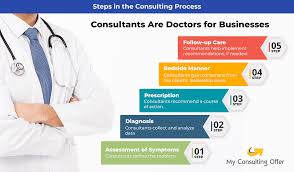Unlocking Business Potential: The Power of Strategic Management Consultancy
The Role of Management Consultancy in Business Success
Management consultancy plays a crucial role in helping businesses navigate challenges, improve performance, and achieve their strategic goals. From small startups to large corporations, organisations across various industries seek the expertise of management consultants to drive growth and innovation.
One key aspect of management consultancy is strategic planning. Consultants work closely with business leaders to develop effective strategies that align with the company’s objectives and market dynamics. By conducting thorough analysis and research, consultants provide valuable insights that help businesses make informed decisions and stay competitive.
Another important function of management consultancy is process improvement. Consultants identify inefficiencies in existing processes and recommend solutions to streamline operations, increase productivity, and reduce costs. Through implementation of best practices and technology solutions, consultants help businesses operate more efficiently and effectively.
Furthermore, management consultants play a vital role in change management. In today’s fast-paced business environment, organisations often need to adapt to market trends, regulatory changes, or technological advancements. Consultants support businesses in managing transitions smoothly by providing guidance on communication strategies, training programs, and stakeholder engagement.
Overall, management consultancy serves as a catalyst for business success by offering expertise, objectivity, and innovative solutions. With their industry knowledge and analytical skills, consultants empower businesses to overcome challenges, seize opportunities, and achieve sustainable growth.
In conclusion, the impact of management consultancy on business success cannot be overstated. By partnering with experienced consultants who understand the complexities of modern business environments, organisations can gain a competitive edge and thrive in today’s dynamic markets.
Seven Essential Tips for Effective Management Consultancy
- Understand the client’s needs and objectives thoroughly.
- Communicate clearly and regularly with the client.
- Use data-driven approaches to analyse problems and propose solutions.
- Build strong relationships with key stakeholders within the client organisation.
- Stay updated on industry trends and best practices in management consulting.
- Ensure project timelines and budgets are managed effectively.
- Provide actionable recommendations that align with the client’s goals.
Understand the client’s needs and objectives thoroughly.
In the realm of management consultancy, a fundamental tip for success is to thoroughly understand the needs and objectives of the client. By taking the time to delve deep into the client’s goals, challenges, and aspirations, consultants can tailor their strategies and recommendations to align perfectly with the client’s vision. This comprehensive understanding not only fosters trust and collaboration but also ensures that the consultancy services provided are truly impactful and beneficial in driving the client towards achieving their desired outcomes.
Communicate clearly and regularly with the client.
Effective communication is essential in the realm of management consultancy, particularly when it comes to maintaining strong client relationships. By communicating clearly and regularly with the client, consultants can ensure alignment on project objectives, progress updates, and any potential challenges that may arise. This proactive approach not only fosters transparency and trust but also allows for timely adjustments and feedback, ultimately leading to successful outcomes and client satisfaction.
Use data-driven approaches to analyse problems and propose solutions.
Utilising data-driven approaches is a fundamental tip in management consultancy to effectively analyse problems and propose solutions. By leveraging data analytics and insights, consultants can gain a deeper understanding of the root causes of issues, identify trends, and make informed recommendations. This approach not only enhances the accuracy of problem diagnosis but also enables consultants to develop tailored solutions that are backed by evidence and have a higher likelihood of success. Embracing data-driven methodologies empowers management consultants to deliver strategic advice that is based on objective analysis, leading to more impactful outcomes for businesses seeking to improve performance and achieve their goals.
Build strong relationships with key stakeholders within the client organisation.
Building strong relationships with key stakeholders within the client organisation is a fundamental tip in management consultancy. By establishing trust, open communication channels, and a deep understanding of the client’s internal dynamics, consultants can effectively navigate challenges and drive successful outcomes. Strong relationships with key stakeholders enable consultants to gain valuable insights, align strategies with organisational goals, and ensure smooth implementation of recommendations. Ultimately, fostering these connections builds a solid foundation for collaboration, enhances project outcomes, and contributes to long-term success for both the consultant and the client organisation.
Stay updated on industry trends and best practices in management consulting.
To thrive in the field of management consultancy, it is essential to stay informed about industry trends and best practices. By keeping abreast of the latest developments, emerging technologies, and successful strategies in management consulting, professionals can enhance their expertise, deliver more effective solutions to clients, and remain competitive in a rapidly evolving business landscape. Continuous learning and staying updated on industry trends are key elements in providing valuable insights and innovative approaches that drive success for both consultants and the businesses they serve.
Ensure project timelines and budgets are managed effectively.
To ensure the success of a management consultancy project, it is essential to manage project timelines and budgets effectively. By setting clear milestones, deadlines, and budget allocations from the outset, consultants can keep the project on track and within scope. Regular monitoring and adjustments as needed help to prevent delays and cost overruns, ensuring that the project stays on schedule and within budget constraints. Effective management of timelines and budgets is key to delivering results efficiently and meeting client expectations in the dynamic field of management consultancy.
Provide actionable recommendations that align with the client’s goals.
When offering management consultancy services, it is essential to provide actionable recommendations that align closely with the client’s goals. By understanding the client’s objectives and challenges, consultants can tailor their advice to deliver practical and effective solutions. These recommendations should be clear, specific, and directly applicable to the client’s unique situation, enabling them to implement changes that drive progress towards their desired outcomes. This approach ensures that the consultancy engagement adds tangible value and contributes to the client’s overall success.





